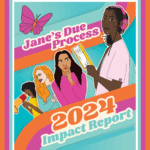If teens are getting pregnant, they’re also having abortions.
Emily Rooke-Ley
Hotline Coordinator, Jane’s Due Process
19 November 2015
As abortion becomes an increasingly contentious issue, debated at dinner tables and in legislatures alike, there is a subset of women seeking abortions that is seldom discussed: teens. We talk about teen pregnancy all the time — why is the rate so high? How do we curb it? How can we help young mothers? We are familiar with the statistics — and we know that they are disturbing. But teen pregnancy does not always lead to teen motherhood. If a young woman wants to have a child, we should absolutely support her and ensure that her child does not become another woeful statistic. But if a pregnant teen does not desire to have a child, she should not be forced to give birth. We ought to provide her accessible options. Teen abortion is rarely discussed — even within the reproductive health community — but we know teens are getting pregnant, having abortions, and are the cohort most desperate for a conducive environment to exercise their legal right to terminate a pregnancy. It’s time we address this topic.
In 38 states, laws require any female under 18 who wishes to terminate her pregnancy to notify or receive consent from a parent or legal guardian. For some teens, this is not a significant burden; they’re blessed with supportive and loving parents. Needless to say, I wish that upon every young woman seeking an abortion. Although a convenient narrative promulgated by those ultimately interested in limiting abortion access, this utopia is a far cry from reality. Far too many teens are trapped in broken homes where it is neither appropriate nor safe to involve a parent in the young woman’s decision to terminate her pregnancy.
For some, like *Destiny, seeking consent from a parent is simply not possible. As a junior in high school and the captain of the track team, Destiny was a mother to a nine-month-old baby boy and a two-year-old girl. She loved running track and was already receiving early college offers. During this time, she was couch-surfing, constantly unsure of where she would sleep each night. Her father was in prison, her mother had been missing for most of her life, and her primary (but not legal) guardian had recently suffered a stroke and was immobile. For Destiny, obtaining parental consent was simply not a tangible option.
For others, like *Jessica, obtaining parental consent is counterintuitive and senseless. Jessica lived in a home where both of her parents abused drugs and alcohol. With two younger siblings, she was the caretaker, dropping out of high school to provide an income for her family and meals for her younger siblings. Her parents, when around, provided nothing for their children. In such conditions, it makes little sense and offers no conceivable benefit to compel Jessica to seek permission and guidance from her parents.
For others, the circumstances are even graver, such as in cases where parents have abused or threatened their daughters. Parental involvement laws put in immediate danger a teen living with a violent father who would abuse his daughter were she to ever become pregnant, or a mother who threatens homelessness were her daughter to have premarital sex . Recently a young woman named *Mary called into our hotline from her bedroom closet. Through distressed whispers she explained that she needed an abortion. When I asked about the prospects of parental consent, she recounted her mother’s heartless invective levied at her pregnant sister years back, calling her a “whore” and slut” before throwing her out the front door. Mary’s sister was never again welcome in the family home. Mary hasn’t seen her since.
Recognizing that not every teen can safely or practically engage a parent in her pregnancy decision, the United States Supreme Court included in Bellotti v. Baird (1979) a requirement for an alternative to parental involvement. The little-known “judicial bypass” is the process in which a minor must petition the courts for the right to terminate a pregnancy without the notification or consent of a parent. These young women must pass through a lengthy set of complicated procedures that would be difficult for any adult, much less a teenager with no parental support.
Each minor must convince a judge that she deserves to terminate her pregnancy without the say of a parent, typically, based on proof of maturity. In other words, a pregnant teen denied an abortion by a judge may be rendered too immature to terminate her pregnancy, yet ostensibly capable to give birth and raise a child. In addition to this terribly twisted logic, the process is confusing, frightening, logistically difficult — and in many cases, emotionally scarring. (Some judges will take callously to berate young women for their unplanned pregnancies or desire to receive an abortion.) Even worse, in many counties, the courts will deny the existence of the judicial bypass altogether, a naked repudiation of the Supreme Court that leaves teens with no safe or legal alternative to parental consent. What should be a clear and accessible process for minors is seldom so; instead, it is subject to a variety of substantial barriers.
At Jane’s Due Process, we have proudly trained a statewide network of referral attorneys to handle judicial bypass cases. We provide minors with guidance and case management from a teen’s first call, all the way through her abortion. Organizations like ours don’t exist elsewhere, despite the abundance of parental consent laws. Consequently, teens in most states are left to navigate the court system and secure a non-biased attorney.
So when we talk about abortion–the intensifying attacks on our reproductive rights, the diminution of access, and the manner in which we can fight back–let’s not forget about teens. Arguably more than anyone, they are the voiceless victims of a disingenuous “safety” or “maturity” law aimed at the imposition of ever-gratuitous burdens to an abortion. Let’s accept the reality that teens will have abortions and that they deserve, like any woman, access to comprehensive care. Let’s consider how we can include them in our movement to truly achieve reproductive freedom.




